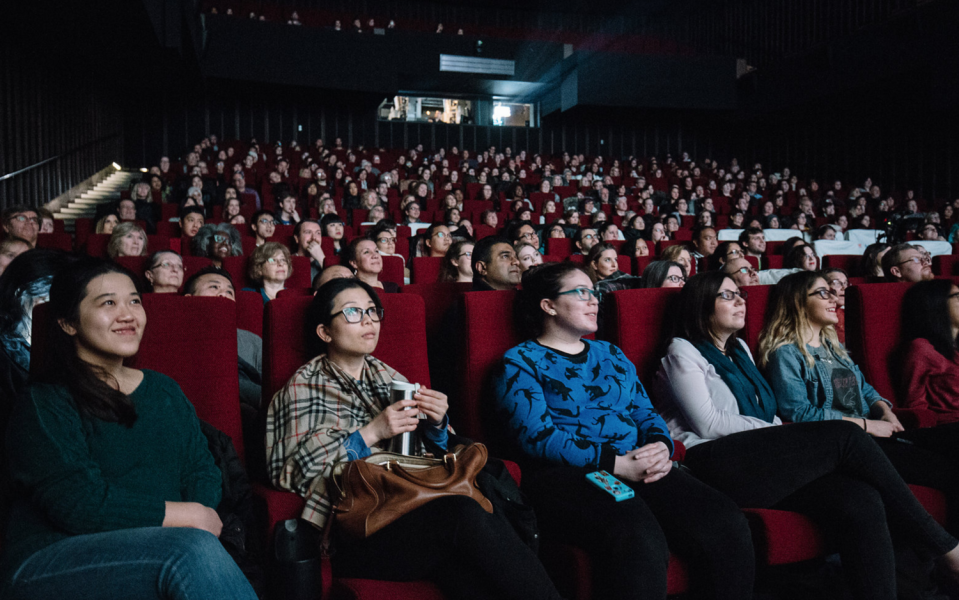

The Review/ Interview/
Our TIFF Is Your TIFF
A panel of critics, programming associates and one OG share their #InfiniteViews of TIFF 16
I love TIFF so much that it hurts a little inside. The magic begins on the first P&I screening of the year when I watch a movie and fully lean into two weeks of premieres, filmmaker interviews and industry events that are part back-to-school and part stress ball of anxiety. (In a good way!)
But what’s more important are the charged experiences of seeing films in a room full of strangers. TIFF is the time when the city of Toronto unites over a deep, resounding love of cinema. To talk about how to survive the next two weeks and all the experiences that make it worthwhile, I gathered together a group of friends (critics, programme associates, writers and one festival OG) as we shared our #InfiniteViews on TIFF 16.
Chandler Levack (Digital Editor/staff writer of The Review): So how long have you been covering TIFF and what's your relationship to it?
Adam Nayman (critic for Cinema Scope): Jesse [Hawken] built the building.
(Kiva Reardon starts singing "We Built This City" by Starship.)
Anne T. Donahue (covering TIFF this year for the Globe and Mail): I've been dating TIFF for approximately three years, off and on...
Jesse Hawken (former employee of TIFF, current freelance film writer): I worked at the festival for about nine years. But I also went to the festival from when I was a teenager, so my first festival was in 1985.
Anne: I was born that year!
Kiva: I wasn't even born then!
Adam Nayman: I've been covering TIFF since 2001.
Adam Cook (critic, programmer at VIFF, programming associate for Piers Handling): This is my fourth TIFF, coming up.
Kiva Reardon (co-host of TIFF's Yo, Adrian podcast, programming associate for Cameron Bailey): I've been coming to TIFF since 2009. The first time I was accredited was 2011. And I started working here for Cameron Bailey last year, so it's my second year working here.
Chandler: I started covering it in 2009 and started working at TIFF in April! But the first thing I saw was in 2005, a screening of Alice Doesn't Live Here Anymore, introduced by Ellen Burstyn. I had to leave before the end because I had class.
I’m interested in what you think TIFF is, how you survive it and what do you think it does to Toronto when it’s happening? Those are good introductory questions, right?
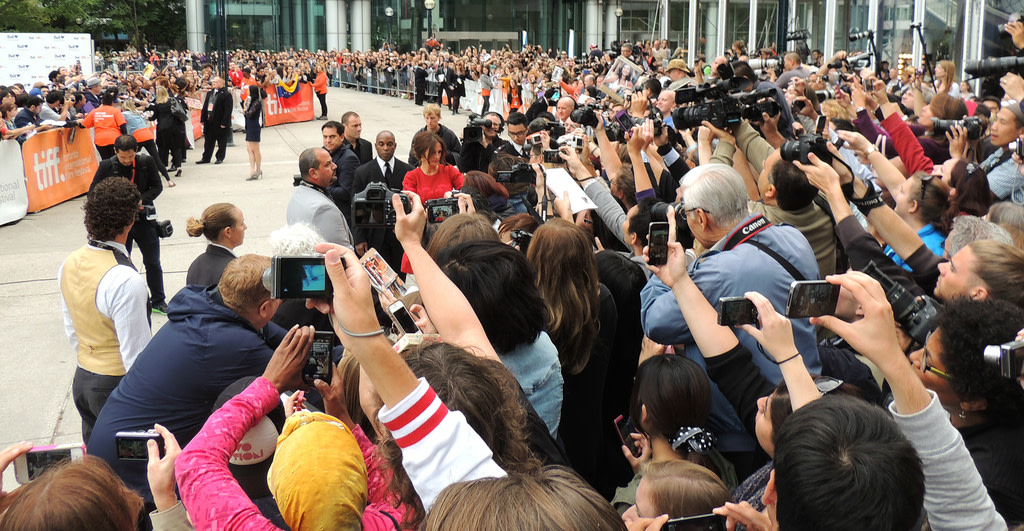
Kiva: I survive TIFF with at least a bottle of hairspray. I used to have a roommate and for 10 days she would wake up at 6:30 in the morning to the sound of "Shhhhhhhh!” That's how I survive TIFF, and with a smile.
Adam Cook: Jesus.
(Laughter)
Anne: I remember we'd drive in from Cambridge and just "walk around." So Toronto comes alive, but there's a bit of a thirstiness. People need to take a sip.
Adam Nayman: I don’t think of it as surviving because it's been my working life for a long time. I remember the first year I covered the festival, these two older Toronto critics saying, "Oh, it's the festival again." And I remember thinking - “I'll never think like that!” And now...
When they switched over to the Lightbox, TIFF became totally different. The restaurants that you go, the places you got coffee, it takes some getting used to.
Jesse: And that's a big change because when the film festival began, it was very scattered. There were all sorts of theatres that don't exist anymore like The Uptown. There were film screenings in the TD Centre, at a theatre that was called The Showcase at Yonge and Bloor. And the corridor in Yorkville was the main hub of the festival.
Chandler: It’s funny because when I first heard about TIFF, it was this "star watching at Sassafraz" mentality. Now TIFF has a totally different identity that feels very Queen West.
Awkwardly segueing here… Can you talk about a film that you saw at TIFF that changed your life?
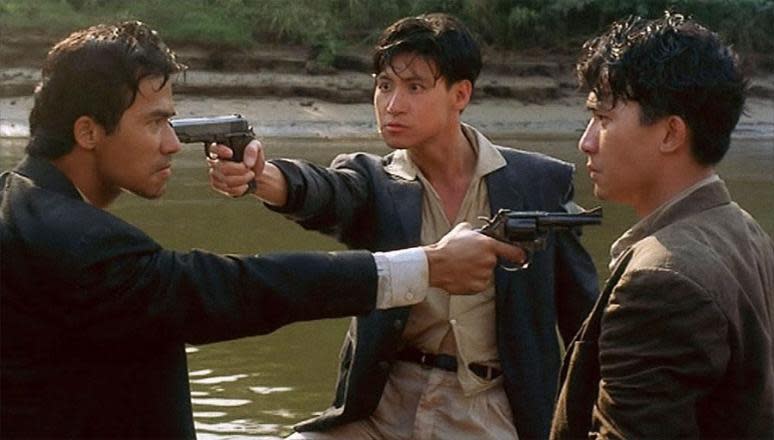
Jesse: I could talk forever about this. In 1989, I saw The Killer by John Woo. Which I then saw again two days later because I couldn't believe what I'd just seen. The following year, it was was Bullet in the Head. When the film premiered, John Woo came running down the aisle like Rocky to a heroes’ welcome. I saw a series of shorts in I guess '88 or so? And it was the Todd Haynes short film, Superstar: The Karen Carpenter Story. I was completely devastated by it.
Adam Nayman: My answer is two movies by the same director. My favourite press screening was seeing Claire Denis' Friday Night with a really dear friend of mine, he doesn’t cover TIFF anymore. And walking from the John Spotton theatre where we had seen the film to The Varsity and having the most wonderful talk about this film. Then I remember going to see the public screening of The Intruder. Claire Denis was there and she was jet-lagged and she was pissed-off.
Kiva: My favourite Claire.
Adam Nayman: People did not like the movie at all. And just this amazing tension of seeing one of the greatest artists in the world, jet-lagged in jeans, dealing with the fact that people didn't like this amazing movie. And the ways that she handled it well, or didn't handle it. I won't forget that.
Peter: It was my first Midnight Madness screening after several years of trying to get into TIFF, but being too young and getting turned away. It was 2005 and I was already a student and a fan of Hong Kong films. It completely blew my mind when Sammo Hung was onstage because I had no expectation that he was actually going to be there. And I had never heard a movie play so loud, I had never heard an audience be so loud. And I thought the guy onstage had a pretty cool job.
(Everyone “awws”)
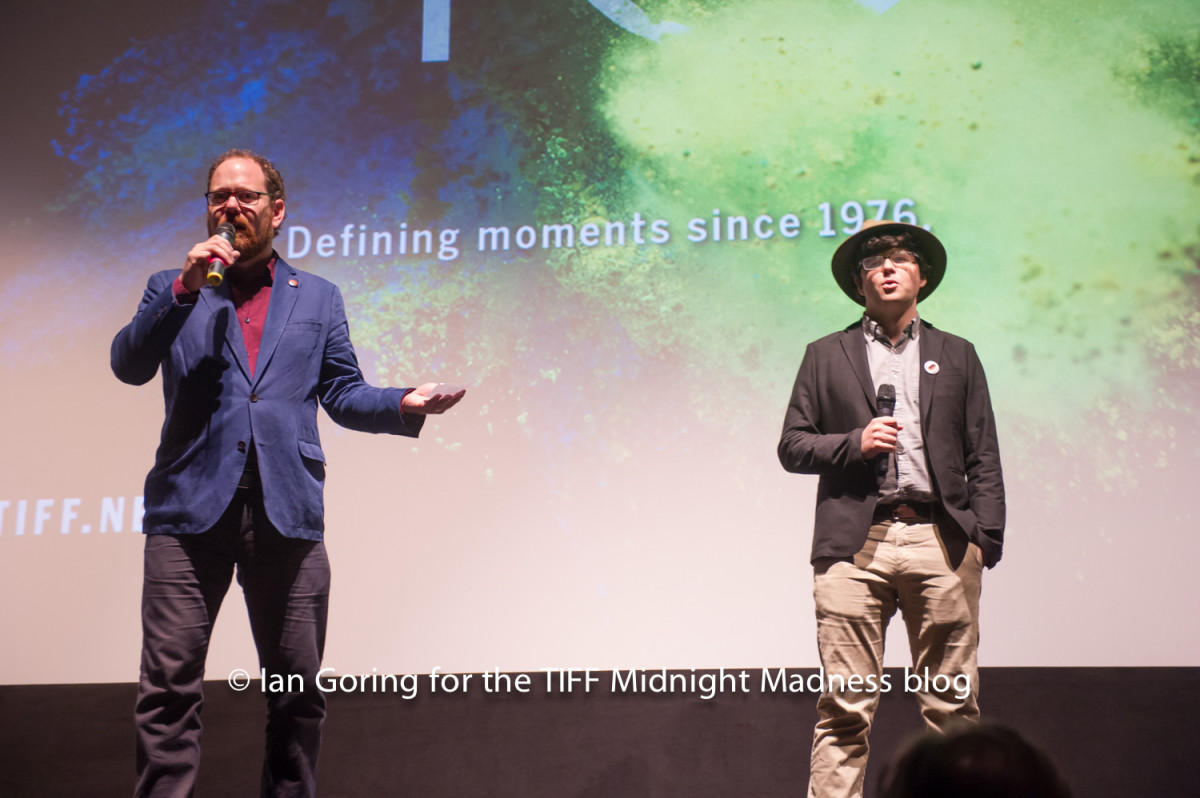
Adam Cook: My best experience at TIFF is extremely recent. Last year, there was a screening of Heat. Michael Mann, who’s one of my favourite directors, was there to introduce it. Not only that, he had handpicked various reels from existing prints of the film to assemble the ideal print of Heat.
But I think there's a lot of different TIFFs, and I don’t take part in all of them. My favourite TIFF is Wavelengths. I think the programme that Andréa Picard puts together every year is phenomenal And whether you like, dislike or fall someone in the middle of what you see - the uniqueness of going to the shorts screenings for four nights in a row and being involved in the discussion afterwards... It’s its own festival and is probably my favourite one.
Kiva: I saw The Master, I guess that was in 2012. And it was in Cinema One, and I was sitting next to an editor of a big film magazine and it was the only seat left. Because I got there late - and I think it was a 70MM print, so it was super packed. And I barely got in. Because I was like, "Fuck I need a coffee and I'm so tired."
Chandler: That’s TIFF.
Kiva: I was super exhausted and super aware that I was sitting next to an important person the entire time on one of the false insert chairs? And then the movie ended, and I was like, "Okay it was very nice to meet you.” And then I got up, walked downstairs and I immediately went to the women's washroom and burst into tears because I found the movie to be so moving.
Chandler: I saw Trash Humpers, the Harmony Korine movie and it was a P&I and every single person walked out, except for me. And I liked it a lot, I thought it was an amazing film. And then I saw another movie… It was a Midnight Madness, kind of Russ Meyers-style, B-movie…
Peter: Was it Bitchslap?
Chandler: Yeah, Bitchslap! I remember the buzz around it being, “This should be Roger Ebert’s favourite movie.” And then I turned around and I saw this guy in a wheelchair that looked a lot like Roger Ebert, and I kept staring at him. And he went (whispers) "Hi", but he couldn’t speak properly. And it was Roger Ebert.
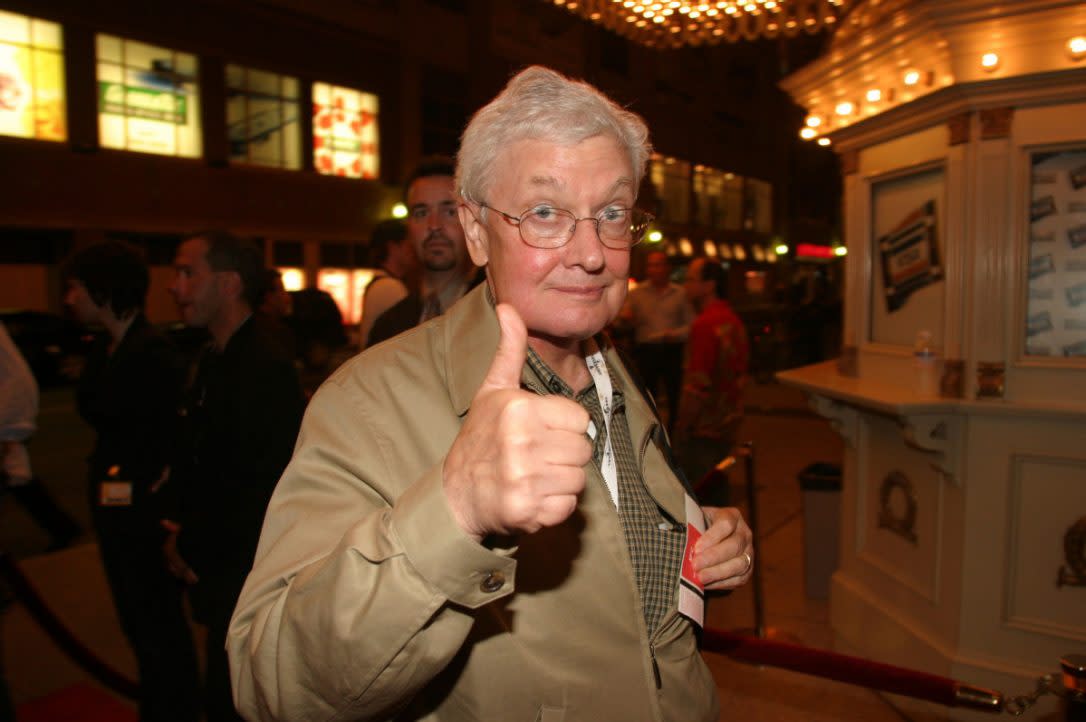
Adam Nayman: I won't say the very bad movie but there was a press screening where Brian De Palma was sitting there with his head in his hands.
Chandler: Whoa!
Adam Nayman: He used to come all the time to P&I stuff. He once asked me what time it was during the boring Sarah Palin documentary.
Anne: Last year, I had to cover the TIFF party circuit for Randi Bergman at FASHION. So we went to the Spotlight party and this is not my scene. I'm standing there with my friend Kevin and we're just literally taking as much bottled water as we can. And I’m like, "I just need to see enough that I can write a paragraph!" But then we see Rachel McAdams getting cornered by this guy trying to pass his mixtape on to her.
Chandler: Oh I remember this! It was at the Spoke Club!
Anne: It was at Soho House. Kevin and I were leaning in, and the guy was like, "So where are you living now? What are you doing?" And she was like, "Well, I've always lived in Toronto." And he was like, "Okay, okay... I just have this tape, I gotta give it to you. What's your email?" And she was like, "I actually don't have email." And he won't stop, he just keeps going. So I was like, "Kevin, I gotta do the club thing where you go up and pretend you know the person." And he was like, "Yeah, you do! He's touching her now." So I go up to her and say, "Rachel! I just want to say that I just love your work so much." And the guy didn't leave. So I'm just staring at this tiny person, and I’m thinking, "Talk! Say any words at this point because you just need to make up a conversation." So I remember that she went to highschool with a guy that was married to my friend. So I was like, "Do you know... DJ from High school?" And she’s like, “Who?" And the guy's still standing there and eventually I grabbed her and I said, "I just didn't know if you still wanted to talk to him anymore." And then she got scooted away, and she smiled at me and the boy was left there, very upset. So I was like, I did my job! I saved a life!
Kiva: And that mixtape was... Drake's.
(Laughter)
Kiva: That does bring up a good point about surviving TIFF, which is stealing shit. And you don't need to buy food, or even drinks if you just walk into places with purpose.
Chandler: I did that last year. I snuck into a lot of parties.
Anne: You just remember - nobody cares. Nobody cares!
Jesse: Don't encourage stealing!
Kiva: It's not stealing so much as taking from the buffet.
Jesse: Jean Valjean wasn't stealing.
(Everyone laughs forever)
Peter: I don't know how I'm going to survive Midnight Madness this year without Big Slice.
Anne: What is that?
Chandler: Peter, explain what Midnight Madness is to Anne.
Peter: Well, Midnight Madness is 10 films in the festival that play at 11:59 PM. And usually there are beach balls in the audience.
Anne: I hate joy, so that's not going to work for me.
Peter: At two in the morning, the movie ends and you go to Big Slice. And that’s why it's going to be a very weird year. My favourite memory in that regard is going to Big Slice and just seeing Bobcat Goldwait by himself eating a slice of pizza. And talking to him for a bit and him saying, "Oh those Wingarden/Barrett guys... That was pretty impressive that they made such a small movie.” He was talking about You're Next. And then he said, "You know, I want to do something like that." So the next year, he made Willow Creek. And I thought it was so cool to see another filmmaker, who had a film in the festival - God Bless America - but he was going to go see other films, and by watching those films, it was inspiring him to make more stuff.
Adam Cook: Yo, are we segueing into food tips, though?
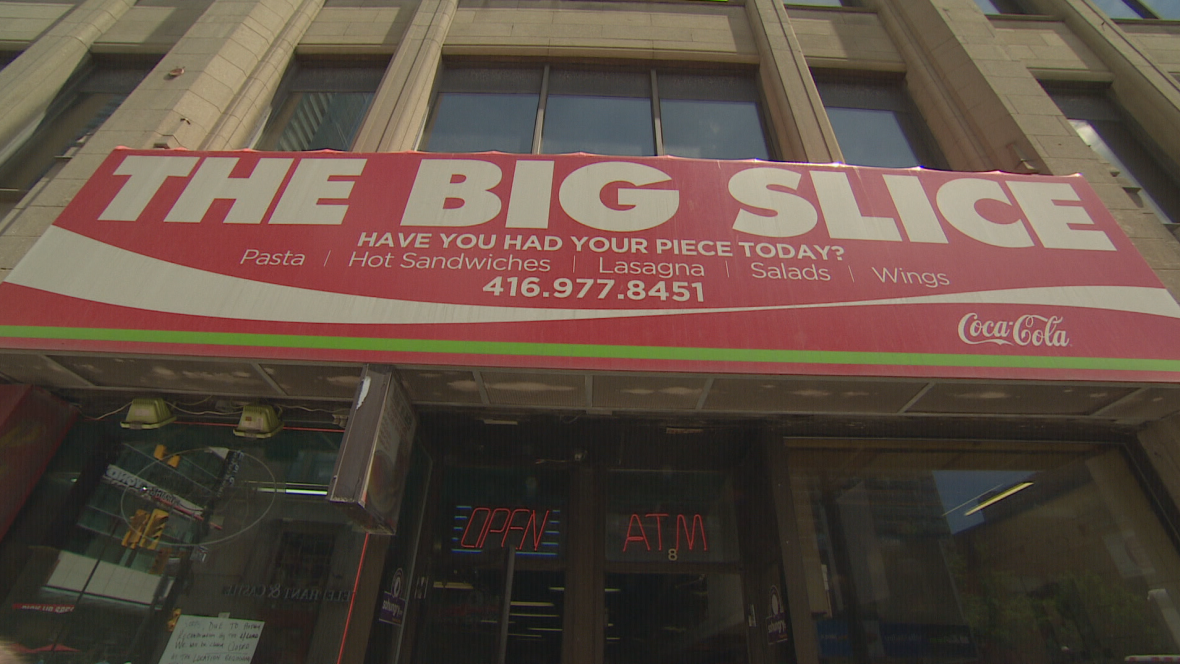
Chandler: First, I want to talk about two ideas. One is that your TIFF co-exists with many other different TIFFs. So your TIFF covering the festival as a journalist is not the same as a filmmaker from Nigeria debuting their first movie, or Anne Hathaway's TIFF -
Kiva: Oh, my TIFF is Anne Hathaway's TIFF.
Chandler: Or, someone who's waiting for four hours in the rain to see Ryan Gosling. This year, it's Infinite Views. So how do you think that idea is expressed through the festival?
Anne: First view, Drake will be sitting on the CN Tower watching TIFF beneath him. View number two, I think perspective is really important because we get really jaded in this industry. TIFF is not about about me, TIFF is not about you. It's about an entire experience that should be inclusive. So don't belittle what brings other people joy. It's so easy to see to see fans waiting outside and be like, "Oh my god." But that’s bringing them joy and the film festival wouldn't exist without those people. Fandoms fuel everything.
Kiva: There’s different kinds of fandom that we value and prioritize differently. Adam mentioned Michael Mann, or the fawning excitement I got when I met Claire Denis. I don't have a "Number One CD" shirt, although that would be cool if someone wanted to make that for me. But no matter what level you're at, you're like, "Holy shit! I get to meet this person!" I am an elitist and I'm not going to pretend that I'm not. But I think I need to check myself a lot, and remember that the times I freak out and have moments of excitement come from the same place as someone else.
Chandler: That’s why I think having this Nigerian programme is so exciting. To see Nigerian audiences in Toronto losing their shit because their Ryan Gosling is here at TIFF.
Kiva: Mohammed Assaf played last year at Festival Street. Some people was like, "Mohammed who?" And I was like "What? He's huge! He won Arab Idol!" People were calling my phone like, "Can Mohammed Assaf come eat at my restaurant? How do I get a hold of him?" There are different star systems that will get people jacked up.
Peter: I did an intro Q&A for Collective Invention last year, which starred a duo from a very popular Korean soap opera. And everyone in the audience just had questions about what was going to happen on the soap.
Adam Nayman: The festival is all about different kinds of access. Fan access, which can be free or expensive. There's access to the movies. And then there’s press access, which is free and sometimes earned and sometimes not. In the middle of these things, sometimes you can access the artists. I consider myself really lucky that people who mean a lot to my inner life are people that I've gotten to talk to. I remember the first year I covered TIFF and because Jason Anderson is so nice, he offered to not interview David Lynch and let me do it. Like, what am I going to ask David Lynch about Mullholland Drive? I’m 20 years old. But getting to do that was phenomenal and doesn't feel like a job.
Chandler: I got to interview Mike Leigh, who is one of my heroes.
Adam Nayman: Was he nice to you?
Chandler: It was me, a journalist from like, the Jewish Journal and then a reporter from the Georgia Straight. And then, Mike Leigh and all of his actors who were in Mr. Turner, including Timothy Spall and Marion Bailey. The first the thing he said when he sat down was: (British accent) "I want a hard chair." And the publicist was like, "What?" And he was like, "This chair, it's not hard enough. I want a harder chair." So they came back and gave him a harder chair to sit on. And I was like, "That's how you become a filmmaker, man!"
Kiva: Adam, I’m actually just curious what it's like to only know a city from a film festival, the way I know Cannes, or Berlin.
Adam Cook: I'm now a programming associate, so I've been living in the city for three months. But going off the idea of there being different TIFFs that we all have access to… I guess the way that I actually defined TIFF previously was by the population, which is not limited to the people who are in Toronto year-round. TIFF brings together an amazing group of people, a coalescence of a community that's usually spread out and only connected by the internet.
Anne: I love film people, but they're not really my people. There's this weird snobbery around film where it's like "Well, it’s not like that." And it's like "calm down," it's the arts.
Peter: I was just gonna say that there's always a better party. If you're at a party, if you're at a film screening, even if you got into that, someone would go, "Oh, you missed this."
Chandler: This helps because I have a lot of anxiety and FOMO during TIFF.
Peter: You can get caught in that trap where you're not paying attention to the person in front of you, you're paying attention to the room.
Anne: I always call that "looking into the future."
Chandler: There’s a lot of scanning the room.
Kiva: Yeah, but sometimes if you're hosting, if you’re doing things… I cannot have an in-depth conversation.
Adam Nayman: Hot tip - go home.
Kiva: My hot tip - don't drink. Have one night where you're gonna get blottoed, but if you drink for 10 days, it's gonna be very hard.
Adam Cook: Here's one hangover tip, though: if you’re at Scotiabank, they already serve food at like 8:30 AM. And I can't remember if it's pulled pork poutine, or a hotdog with pulled pork...
Everyone: Ewwww!
Kiva: The Town Crier has legitimately, for years, fueled me. There's been moments where I feel like I'm gonna collapse on the sidewalk at King and John. And then I go to the Town Crier, and I sit down and I eat their Crier salad and I come alive.
Anne: What is the Crier salad?
Kiva: There’s like a sausage, there's an egg, you got some protein, greenery...
Chandler: Like a Cobb situation?
Kiva: Yeah, it's really good.
Chandler: Last year, I got a pumpkin spice latte and I saw Cemetery Of Splendour at 9:30 AM and I had laid my clothes out the night before. And I talked to all my friends after the screening about how good the movie was. And I remember thinking, "I'm so happy right now."
Kiva: That’s great advice - figure your outfits out in advance. Because the idea of figuring out a look for: "Okay I’m doing this Q&A, I'm hosting this lunch and then I have to meet with this person and go to this party." Like, what's an appropriate outfit for this entire range of things?
Chandler: When I went to the CFC, we got passes to TIFF. And we had this meeting with our screenplay mentor and someone was like, "What do we wear?" And she was like, "Everyone at TIFF wears black leather jackets."

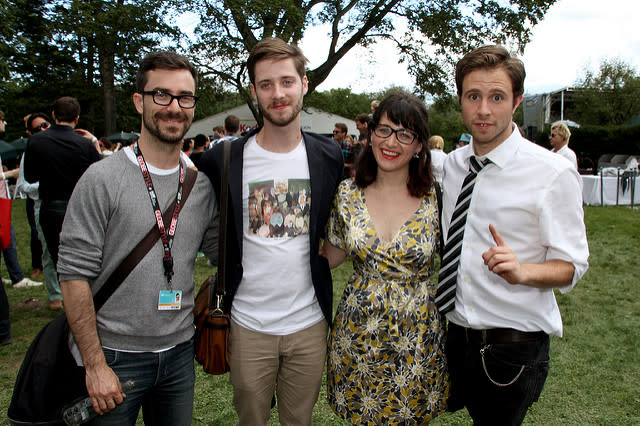
Anne: Just keep reminding yourself, nobody cares. It's gonna be fine. The worst case scenario - you will deal with it. Because I think it's so easy to panic and be like, "Oh, what if I miss this?" Honestly, unless you literally throw up on Brian DePalma's lap...
Chandler: He might like that.
Kiva: He might like that.
Chandler: How does working for TIFF change your relationship to it?
Peter: I find that I’m less starstruck with celebrities. It’s just less a big deal if I get to meet them or not. I can sometimes be jaded towards people who demand to be let into a theatre because they're the biggest fan of the celebrity and need to get their autograph. But that's just because I've had the priviledge to have a professional/personal relationship with some of these celebrities. It just no longer means as much.
(We all laugh)
Adam Cook: End of article!
Peter: That sounds harsh! What does mean a lot is showing the movies... Especially at Midnight Madness. People want to be entertained and have an energy level that’s very distinct.
Jesse: Some films are dependent on that energy.
Chandler: It’s so cool when a whole room is so pumped to see a first-time Canadian feature. Like Sleeping Giant last year!
Jesse: I remember a few years ago, I went to a 9 AM screening of a Japanese movie by Shunji Iwai called Love Letter. And I cried all the way through it. I was shocked that a movie could get that kind of a reaction out of me so early in the morning.
Chandler: Same. Room last year, I just held the person next to me.
Kiva: Did you know them?
Chandler: No, it was a guy who owned an art house theatre in Dayton, Ohio.
Peter: Do people have any thoughts on the pre-Twitter and post-Twitter era and how that's affected film festivals? Just the idea that you walk out of a movie and go, "Huh, so that's what everybody thought. Okay, that’s what I think."
Jesse: There was a time when you went to see a movie and you had to talk to somebody to find out what they thought about it.
Kiva: Tell me more, old man! Shakes fist at sky!
Chandler: Did you go see the Boogie Nights screening at the Uptown?
Peter: What would have been your tweet, Jesse?
(Laughter)
Jesse: Well, I didn't love Boogie Nights as much as everyone did, but it is fun to be in on the ground floor of a film like that. I was also at the premiere of Reservoir Dogs. Tim Roth kept leaving every 15 minutes to go have a cigarette.
Peter: So goes a true Midnight story, which is that they all stuck around to watch Braindead and then Tim Roth vomited over the balcony.
Anne: From all the cigarettes?
(Laughter)
Adam Nayman: I think Twitter can be a good release valve. But I'm not sure about the calculus that because there’s these quick-tweeted reactions, that there are no good long discussions. I mean, they can often precede those things or anticipate them.
Chandler: It’s interesting how we're talking about these emotional reactions. Because I think there’s something about seeing five movies in one day, and doing that non-stop… It's weird to have these really charged reactions where you’re in front of other people when we're used to watching movies alone on Netflix.
Kiva: And it's like camp, too! You're seeing a whole bunch of people you don't always see… The amount of time at festivals I spend dodging exes… those things come up, too.
Adam Cook: Movie-going is a negotiation between a private and public experience. Another favourite memory of mine is when I saw The Wind Rises a few years ago. I'm also known to cry at movies. But usually, at least in my case, you try to stay quiet. I remember this beautiful moment where I heard this stranger to the right of me start crying. So it was like, "okay, I'm allowed." And then I cried for the rest of the movie. When the movie ended, there was something really spectacular where usually people are flooding out of a film when the credits roll because they've got to get to the next thing. But half the audience was still sitting down and the number of people with tears down their cheeks was just amazing.
(Silence)
Kiva: Cinema.
Anne: I'm literally not a film person. I think of myself as someone who loves pop culture en-masse, but I don't know half the stuff you are talking about. When I go into TIFF, it's different for someone who is like, "Oh sick! Pop culture being celebrated!' You learn so much about the rest of the world through movies, music, fashion and all those things amalgamate at TIFF.
Kiva: And this year - VR. (Winks)
Jesse: One of the most tremendous moments was when the festival had the “Dialogue” series... I was in the room when Chow Yun-Fat introduced One Flew Over the Cuckoo's Nest, which he said was a major influence on his acting. And when you watch One Flew Over The Cuckoo's Nest, and then you watch City On Fire, or A Better Tomorrow, you go: "Oh my god, that's all from Jack Nicholson." And I would've never seen that if he hadn't said it.
Chandler: There's a universe guiding you towards stuff. One time, I was doing an interview for CBC outside the Lightbox. And then I saw a rush line and I was like, "What are you guys in line for?" And they were like, "Oh, a free screening of Ghostbusters." So I got in line and then it turned out that Bill Murray was introducing Ghostbusters and that it was “Bill Murray Day.” He did a Q&A that actually changed my life. Somebody in the audience was like, "What is it like to be Bill Murray?" And he was like, "Let's all just take a moment. Feel the weight of your body in your seat. What's it like to be you?" And he went into his philosophy on life - and it was this really beautiful existential moment that I'll never forget. I walked out and something in my molecules just shifted a little bit. I never would've had that moment if I hadn't been there in the right place, right time.
And the worst thing I ever ate at TIFF was anchovy paste on a radish.